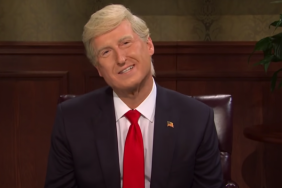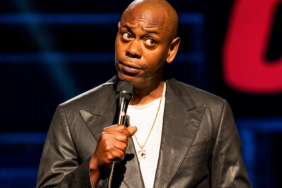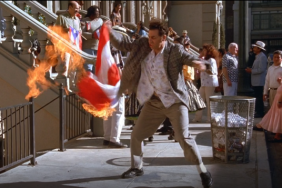
I thought I’d give myself an easy assignment for the week I’m traveling to SXSW. With sketch comedy, the Best Episode Ever is simple. It’s the one with the best sketches, right? “Chappelle’s Show” only had two proper seasons * anyway, so how hard could it be to narrow it down? It turned out to be a really close call.
“Chappelle’s Show” was a showcase for comedian Dave Chappelle’s witty insights into race, celebrity and society. The show became so successful on Comedy Central that his deal for future seasons was reportedly worth $50 million. The fact that he abandoned that deal kind of makes “Chappelle’s Show” more legendary. It never had the chance to burn out.
Chappelle’s satirical perspective was a welcome irreverence with profound insight that was refreshing at the time, and it is still poignant today. A sketch like the famous blind white supremacist Clayton Bigsby (Chappelle) pointed out how arbitrary racism could be, plus the double meaning of blind devotion to an ignoble cause. Bigsby was a KKK leader who didn’t know he was black, because he’s blind. In the end, he stuck to his beliefs despite finding out the truth. In other sketches, Chappelle might have a choir sing the Diarrhea song.
There were some outstanding collections of sketches, some episodes with nary a dud in the bunch, but I’m going to have to give the edge to the episode that is essentially one long three part sketch. Season two, episode four devotes the entire episode to “Charlie Murphy’s True Hollywood Stories” about Rick James. Chappelle would hate me for choosing this because the catch phrase “I’m Rick James, bitch” became such a burden, he couldn’t even perform standup without constant interruption from fans.
“I’m Rick James, bitch” may be one of the easier laughs in the episode, but nonetheless, these True Hollywood Stories combine everything that “Chappelle’s Show” was great at. It is about race because James comments on how dark skinned the Murphy brothers are. It is all about Hollywood privilege, which ultimately became a breaking point for Chappelle himself. It’s got one of Chappelle’s most iconic impressions, and it’s all true! Yes, the dramatization is part of what makes it funny, but this real life anecdote was indicative of all the social mores Chappelle wanted to address, and he has great fun acting it out.
In part one of Charlie Murphy’s True Hollywood Story, Murphy, one of the show’s writers, recalls when he and Eddie used to hang out with Rick James. Chappelle plays James, living it up hedonistically in a club, justifying his behavior with the line, “I’m Rick James, bitch.” That is what gives the line such power. It’s not just referencing the character Chappelle performed. It’s that manhandling women and disrespecting people is justified simply by the entitlement of fame. We’re complicit in “I’m Rick James, bitch,” because we allow him to be Rick James, bitch.
James himself appears in an interview during these sketches, and admits that he used to mess with Murphy. One night Murphy confronted James and James punched him in the face, leaving a mark from his “Unity” ring in Murphy’s forehead. Murphy went back to James’ hotel room for revenge, but they ended up sharing an emotional moment, played by Chappelle and Murphy as a heartwarming resolution.
That’s fun and silly, but the second story escalates the themes. James comes over to Murphy’s house wearing dirty boots and puts his feet up on the couch, which belongs to Eddie. He’s not just being inconsiderate, James starts aggressively rubbing his boots all over the white couch smearing dirt all over the place. Chappelle has a ball clowning it up. James himself admits that he intended to mess up the couch because he knew Eddie Murphy was so rich he could buy another one. Isn’t that celebrity entitlement? Just buy a new couch, and I have so much contempt for our mutual wealth that I will make sure you need a new couch.
The interview with James catches him in a moment too. He denies such behavior and then immediately confirms he purposefully messed up Eddie’s couch, so the editors play the soundbite back immediately to juxtapose his admission with his denial on both sides of the statement. That’s a pretty biting touch in the post-production.
The third story has James in another club being even more sexually abusive than before, getting women to bare their breasts and then criticizing the breasts. He’s acting up so much that he slaps Charlie Murphy in the face. When Charlie confronts him again, James sincerely does not remember the incident that just happened because he’s just that oblivious. This segment too ends in an emotional moment of forgiveness between Murphy and James.
These are all examples of the abuse of celebrity privilege, with little hints at racism with James calling the Murphy boys Darkness Brothers. Chappelle is able to exaggerate the offenses in his performance of it, but it’s the same satire he would have executed had he made the whole story up. He just happened to hear his writer tell a story that was the perfect example of the behaviors he spoofed in R. Kelly and Lil Jon sketches.
James seems a good sport about it, and he gets his comeuppance in the forms of beatings from Charlie Murphy. In the interview, James keeps repeating “Cocaine’s a hell of a drug,” or maybe it was one soundbite they keep replaying. It’s a good thing Chappelle didn’t split up this story to run a new Rick James segment in three different episodes. There is an effective trilogy aspect to it in which the second story is the most blatantly rude, but the third escalates the themes of the first story and brings it to a conclusion.
This episode unfortunately begins with the Love Contract sketch which is about signing consent forms before having sex. I think you probably shouldn’t be joking about sexual consent, but I think it was a reference to the Kobe Bryant rape scandal so it would have been timely. Rashida Jones is in that sketch as Chappelle’s lady friend.
It’s a shame Chappelle felt overwhelmed by the response to the show and the demands of production. Production is hard, not that standup is easy, but I wouldn’t begrudge him wanting a break from production. I just wish we could have seen his perspective on the events of the last 10 years: the Obama presidency, the economic crisis, Justin Bieber.
The tipping point seemed to be a third season sketch about black pixies that control racial stereotypes. Time Magazine reported that a white spectator laughed at the sketch in a way that made Chappelle uncomfortable, like he wasn’t getting the point of making fun of racism. He was just enjoying the racist stereotypes. Sadly, there will always be people who don’t get the joke. You shouldn’t deprive the rest of the world your insightful humor. Chappelle’s comedy could have reached far more people who did get the joke and received the correct message.
That’s just the anecdote most commonly reported, that stands out in my mind from the whole season three kerfuffle. There was probably much more to the story and it’s good for Chappelle to be sensitive and cognizant. I just hope he didn’t give up a chance to make a real impact because some people were the perpetrators he was satirizing. They did air that sketch in the season three compilation and I simply thought the pixie sketch wasn’t funny. I wouldn’t worry about its racial impact, I would have just cut it because it wasn’t funny enough.
“Charlie Murphy’s True Hollywood Stories” is the Best Episode Ever, but if I could make a supercut of the ultimate “Chappelle’s Show” episode, it would be: R. Kelly “Piss on You,” Blind Supremacy, Jedi Sex Scandal, A Moment in the Life of Lil Jon and the Ask a Black Dude with Stephen King.
* Sketches from the incomplete third season were compiled without Chappelle hosting.








